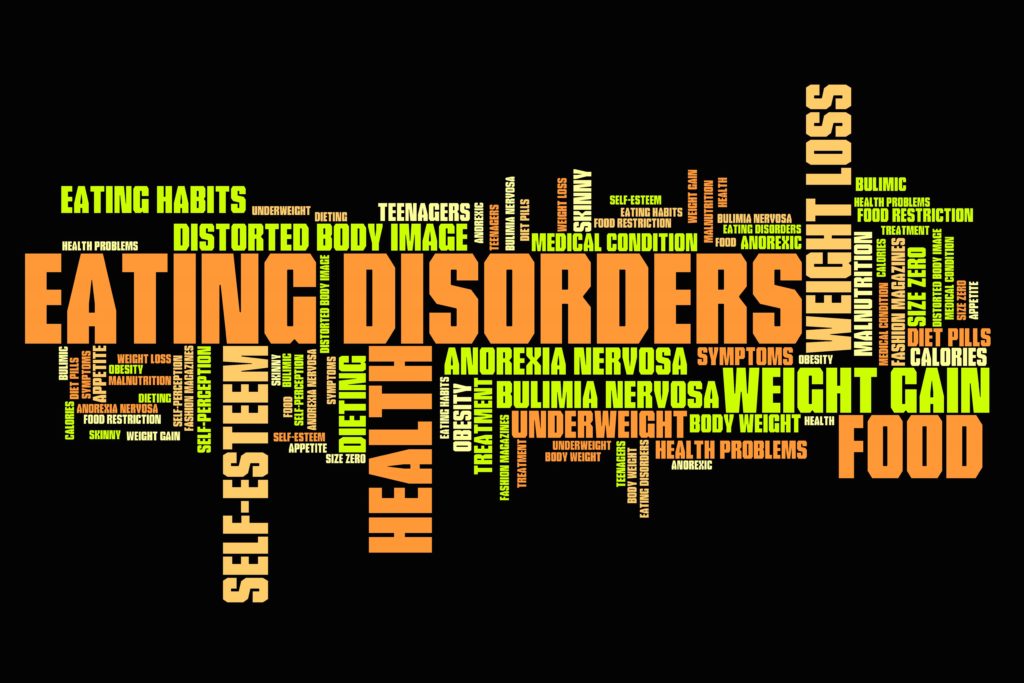
There is a simple 5-question screening tool called the SCOFF that was developed for use by both clinicians and non-clinicians. The SCOFF has high sensitivity, is available at no cost, and is easy to incorporate into one’s routine initial intake evaluation.
Here is what the letters of the acronym SCOFF stand for:
S: Do you make yourself SICK because you feel uncomfortably full?
C: Do you worry you have lost CONTROL over how much you eat?
O: Have you recently lost more than ONE STONE in a three-month period? (The SCOFF was developed in England. In the US, replace the words “one stone” with “15 pounds”)
F: Do you believe yourself to be FAT when others say you are thin?
F: Would you say that FOOD dominates your life?
So, we can remember the five screening questions in the SCOFF questionnaire by the keywords Sick, Control, One stone, Fat, and Food.
An answer of yes to TWO OR MORE of these five questions suggests the possibility of anorexia nervosa or bulimia nervosa. That is, the screen is positive. This does not mean that the person HAS an eating disorder but only that further assessment for an eating disorder is warranted. Also, even if a person answers “Yes” to a single question on the SCOFF, it should raise a red flag and warrant further evaluation.
Two more questions
1. Along with the five SCOFF questions, asking another question increases the sensitivity of our screening for bulimia nervosa: “Do you eat in secret?”
A “yes” to the question “Do you eat in secret?” or to “Do you worry you have lost control over how much you eat?” (one of the five SCOFF questions) should prompt further assessment for possible binge-eating disorder because these are two of the diagnostic criteria for binge-eating disorder.
2. Another screening question that should be asked because it specifically screens for current binge-eating disorder is: “During the last 3 months, did you have any episodes of excessive overeating (i.e., eating significantly more than what most people would eat in a similar period of time)?”
In writing may be even better
When subjects were given the SCOFF in writing and filled it out on their own, the scores were higher. This suggests that subjects may be more willing to disclose symptoms suggestive of an eating disorder when asked the questions on a written form than when asked the same questions face to face.
Many translations are available
The SCOFF has also been translated into several other languages, including Arabic, Catalan, Chinese, Danish, Finnish, French, German, and Spanish.
Let’s get the word out! Please share this page widely on social media or by email.
Next steps for Members
Members of this website should read more about how to screen for eating disorders in the articles that are linked to below.
Related Pages
Why it is important for all of us to screen for eating disorders
How to screen for eating disorders
How to evaluate persons who have or may have an eating disorder
Binge-Eating Disorder
Binge-Eating Disorder Screener-7 (BEDS-7)
New medication approved by FDA for Binge-Eating Disorder
Yale Food Addiction Scale
Instruction sheet for the Yale Food Addiction Scale
Should we prescribe medications for weight loss?
Why it is important to treat obesity
Medications for the treatment of obesity: Overview
Melanocortin 4 receptor (MC4R) and weight gain
What are the BEST books on each topic related to psychiatry/ mental health?
References
Morgan JF, Reid F, Lacey JH. The SCOFF questionnaire: assessment of a new screening tool for eating disorders. BMJ. 1999 Dec 4;319(7223):1467-8. PubMed PMID: 10582927; PubMed Central PMCID: PMC28290. The full text of this paper is available free at this link: https://www.ncbi.nlm.nih.gov/pmc/articles/PMC28290
Copyright © 2021, Simple and Practical Medical Education, LLC. All rights reserved. May not be reproduced in any form without express written permission.
Disclaimer: The content on this website is provided as general education for medical professionals. It is not intended or recommended for patients or other laypersons or as a substitute for medical advice, diagnosis, or treatment. Patients must always consult a qualified health care professional regarding their diagnosis and treatment. Healthcare professionals should always check this website for the most recently updated information.
Leave a Reply